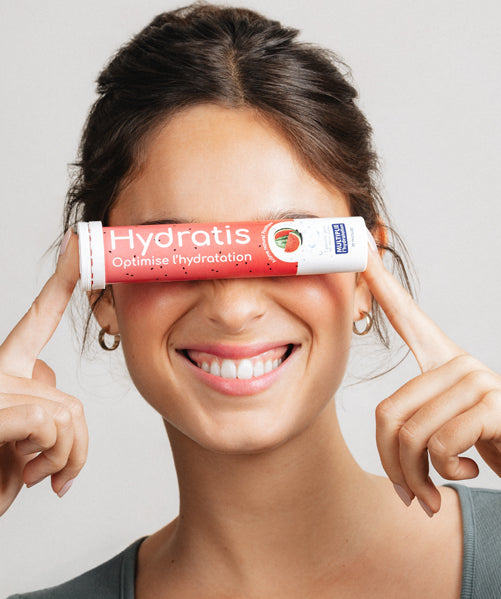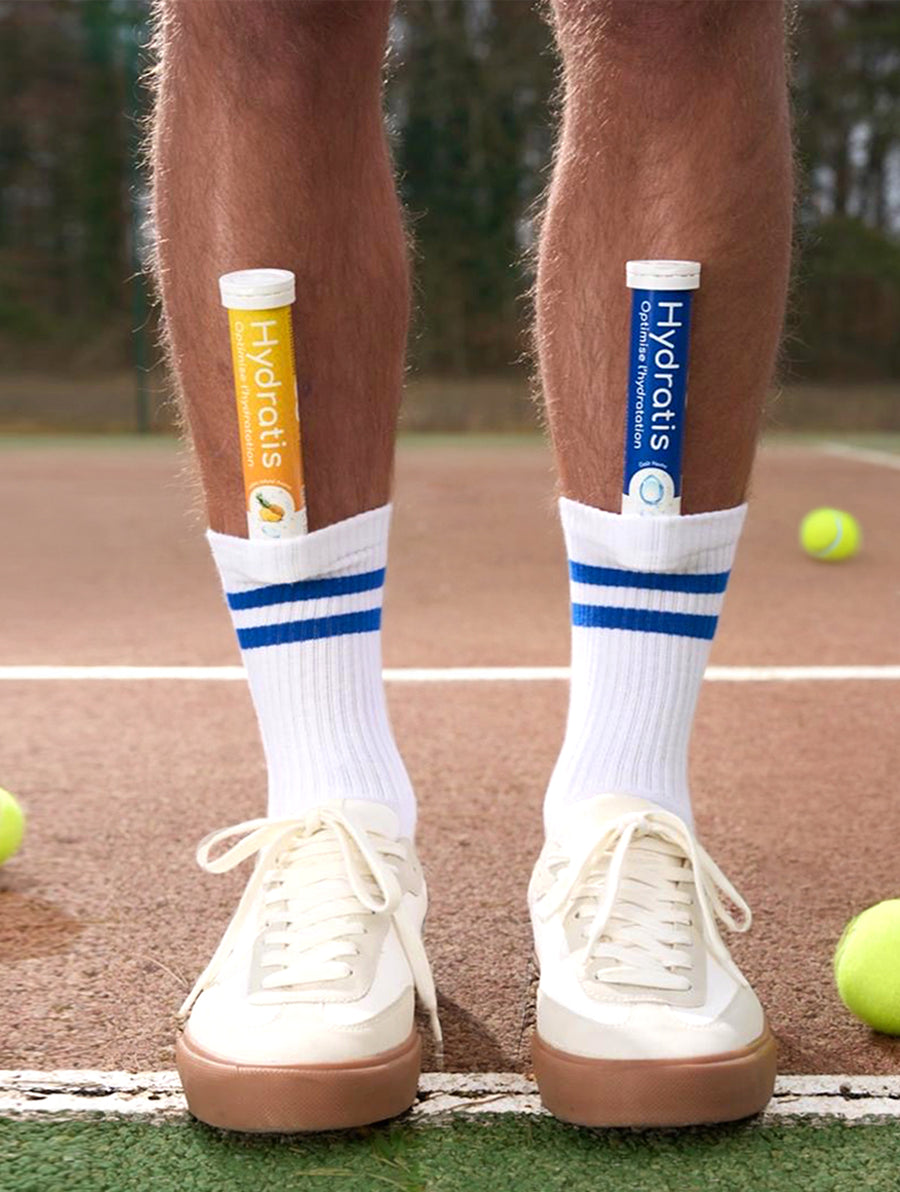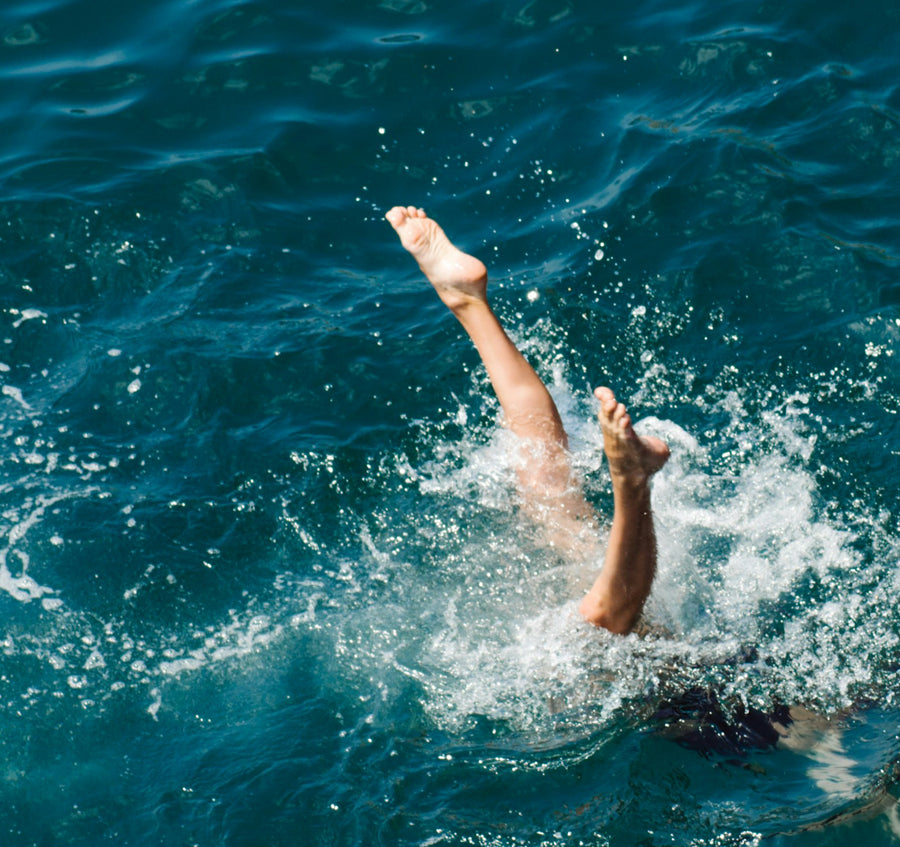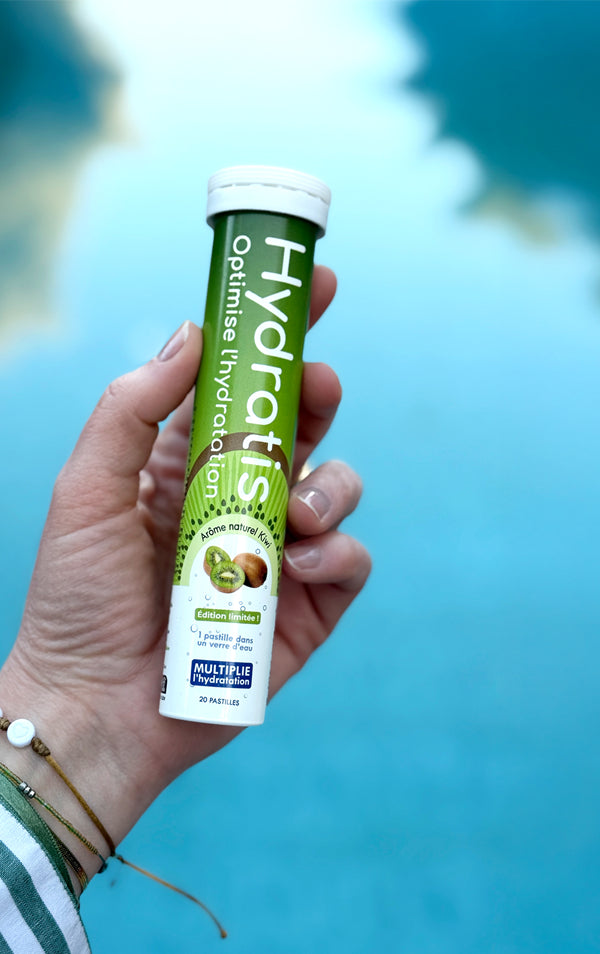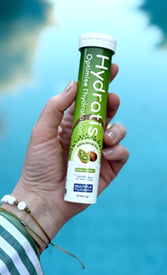Did you know that the water you drink can be much more than just a source of hydration ? Some mineralized waters, whether sparkling or still , provide essential minerals , such as magnesium.
Just like sodium or potassium, this mineral plays a key role in the functioning of your body, particularly in your muscles, nervous system, and bones. Yet, some people are deficient in it, without necessarily realizing it.
Drinking magnesium-rich water then becomes a simple and natural way to supplement your daily intake. In this article, you will discover why magnesium is essential for your health, what the signs of a deficiency are, and which water can help meet your needs.
What is magnesium and why is it essential?

What is magnesium?
Magnesium is one of the essential minerals for the proper functioning of the body. Nearly half of the body's magnesium reserves are stored in your bones and teeth . The other half is present in muscles and nerve cells, as well as in small amounts in the blood . Although indispensable, magnesium is not produced by the body . Therefore, the food and water (mineralized or not) you consume are its main sources .
What is its role in the body?
Magnesium is involved in more than 300 enzymatic reactions .
In concrete terms:
- It allows your muscles to contract and relax normally .
- It plays a key role in the functioning of your nervous system by facilitating the transmission of signals between cells and maintaining the balance of neurotransmitters.
- It is also essential for the production of ATP , the molecule that provides energy to your cells.
- It contributes to the health of your bones by helping their mineralization in synergy with calcium and vitamin D.
What are the benefits of a good magnesium intake?
When your magnesium intake is sufficient , your body derives numerous benefits:
- You experience less fatigue, anxiety, and stress.
- You are less prone to migraines, muscle cramps and menstrual pain.
- You recover more easily after exercise because it has a relaxing effect on your muscles and reduces inflammation.
- You have a better quality of sleep.
Important: While the role of magnesium in major vital functions is well established , other suggested effects are still based on limited studies with contradictory results.
Magnesium deficiency: pay attention to the signs
What happens when you are deficient in magnesium?
A magnesium deficiency ( hypomagnesemia ) can affect your body in several ways.
You may indeed experience : persistent fatigue, irritability, sleep disturbances, tremors, muscle cramps or headaches... In the long term, a chronic deficiency can have a negative impact on health and promote cardiovascular, bone or metabolic complications , particularly in the elderly, pregnant women or athletes.
Note : The symptoms of a magnesium deficiency are not always specific. A blood test is necessary to confirm the deficiency. Consult your doctor for a reliable diagnosis.
Daily magnesium requirements (by age and sex)
Your magnesium requirements vary depending on your age, sex, and certain specific situations.
A sedentary adult does not have the same needs as an athlete, just as a pregnant or breastfeeding woman will have much higher magnesium requirements.
Here are the average recommendations established by EFSA :
-
Children: 80 to 200 mg per day depending on age.
-
Adolescents: approximately 300 to 410 mg per day.
-
Adults: 310 to 420 mg per day.
-
Pregnant women: up to 400 mg per day.
Water: a simple and effective source of magnesium
Why drink water rich in magnesium?
Drinking magnesium-rich water can be a simple and natural way to increase your daily intake. Unlike a dietary supplement such as magnesium bisglycinate, water fits easily into your routine and carries a very low risk of overdose , as long as your kidneys are functioning normally. Furthermore, the magnesium present in mineralized water is well absorbed by your body .
Important : Some medications (laxatives, antacids) also contain magnesium. Check before increasing your intake with water.
Is drinking water rich in magnesium enough to meet your needs?
Drinking water rich in magnesium can cover 20 to 30% of the contribution The recommended daily intake , or even more with more concentrated waters. Everything depends, of course, on the concentration (expressed in mg per liter) and the quantity consumed.
To fully meet the daily requirement , it is important to supplement with a varied diet. This involves focusing more on foods rich in magnesium: green vegetables (spinach, chard), dried fruits (almonds, walnuts), oilseeds, or even cocoa.
Is it safe to drink magnesium-rich water all day long?
Yes, you can consume it throughout the day without any problem, provided you supplement it with magnesium-rich foods and maintain a varied diet tailored to your individual needs. However, if you suffer from kidney problems or are on a strict diet (for example, a low-sodium diet), it's best to consult your doctor before increasing your intake.
Ranking of the mineral waters richest in magnesium
Not all magnesium-rich waters are created equal in terms of mineral composition. To identify a magnesium-rich water , it's essential to read the labels . Manufacturers always indicate the mineral content per liter of water .
The key value to monitor is the "Mg²⁺" reading. When it exceeds 50 mg/L , you can consider it a promising result.
Natural mineral waters
The average magnesium content of mineral waters on the market varies from 50 to 160 mg/litre , with price and taste varying according to brand.
-
Rozana: 160 mg/L – the water richest in magnesium available on the French market, ideal if you want to quickly boost your intake.
-
Hepar: 119 mg/L – recommended if you have slow transit, as it combines magnesium and a mild laxative effect.
-
Badoit: 80 mg/L – sparkling water with a subtly salty taste, perfect if you enjoy sparkling water rich in minerals.
-
Contrex: 74 mg/L – very rich in calcium, it is also a good source of magnesium.
-
Quézac: 69 mg/L – a balanced natural sparkling water that can perfectly accompany your meals.
-
Courmayeur: 52 mg/L – mild and balanced, it is suitable for daily family consumption.
-
San Pellegrino: 50 mg/L – rich in magnesium and bicarbonate, it is ideal if you wish to facilitate your digestion.
What is the difference between Rozana and Hépar?
Are you hesitating between Rozana and Hépar? Here's how to make your choice:
- Choose Rozana if your primary goal is to maximize your intake in a simple and direct way. It stands out naturally with its high magnesium content (160 mg/L compared to 119 mg/L).
- Choose Hépar if, in addition, you wish to benefit from its natural laxative effect and improve your digestive comfort .
And what about tap water?
In France, magnesium can also be present in tap water , but in highly variable proportions depending on the region. Its concentration depends on the hardness , which is itself linked to the geological nature of the soils it passes through.
It is possible to find tap water rich in magnesium (10 to 30 mg/L) in areas with "hard" water. While this value is modest compared to mineral-rich waters, it is not negligible if you consume 1.6 to 2 liters of water daily . Conversely, in areas with soft water, the content often falls below 10 mg/L. To find out the exact composition of your tap water, consult the water quality report at your local town hall .
What is the best magnesium-rich water according to your needs?
To help you choose the water best suited to your situation, here is a summary table:
|
Your needs |
Recommended waters |
Why choose them? |
|
Fatigue and stress |
Rozana, Contrex |
Their high magnesium content promotes relaxation and vitality. |
|
Digestive problems |
Hépar |
Its gentle laxative action helps to regulate bowel movements |
|
Sporting activity |
Saint-Yorre, Badoit, San Pellegrino |
Their richness in minerals and bicarbonates facilitates recovery |
|
Children and pregnant women |
Courmayeur, Quézac |
Their balanced and moderate sodium profile is suitable for the whole family. |
To combat fatigue and stress
If you feel tense, anxious or tired, choose Rozana or Contrex. They will help boost your magnesium intake and restore your energy .
For digestive problems
Suffering from mild constipation ? Hépar is your ally. Its high magnesium content, combined with sulfates, stimulates bowel movements . This mineral water is specifically marketed for this purpose.
For athletes
If you engage in regular physical activity , opt for sparkling waters such as Saint-Yorre , Badoit, or San Pellegrino . They replenish minerals lost through perspiration, and the bicarbonates they contain help neutralize muscle acidity to promote better recovery.
For children and pregnant women
If you're looking for a magnesium-rich water suitable for the whole family , choose Courmayeur or Quézac . Their balanced mineral composition makes them particularly safe for daily consumption.
Just like iron and other minerals, magnesium requirements increase during pregnancy . Pregnant women should, however, favor mineral waters with a balanced profile, without excess sodium, such as Courmayeur and Quézac.
The limits of magnesium-rich waters

Should we prioritize water or supplements?
Mineral water remains the most natural and simplest solution to increase your magnesium intake, without the risk of overdose that is sometimes associated with dietary supplements taken in excess.
Magnesium is available as a dietary supplement in various forms (such as magnesium bisglycinate or citrate). These may be useful if you have a confirmed deficiency or higher specific needs. In any case, always consult your doctor or pharmacist.
When should supplementation be considered?
You may want to consider magnesium supplementation if:
- You experience persistent fatigue or cramps despite a balanced diet and sufficient consumption of magnesium-rich water.
- You practice an intensive sport and lose a lot of minerals (sodium, potassium, magnesium) through perspiration.
- You are pregnant or experiencing a prolonged period of stress.
- You have a magnesium deficiency confirmed by a blood test.
Answers to frequently asked questions (FAQ)
Which water is richest in magnesium?
In the French consumer market, Rozana mineral water is the richest in magnesium with a content of 160 mg/L. It's ideal if you want to quickly supplement your magnesium intake.
What is the difference between Hépar and Rozana?
Hépar acts on transit in addition to providing magnesium, while Rozana is ideal if you primarily want to enrich your intake.
Is it good to drink water rich in magnesium?
Yes, it's an excellent natural way to supplement your daily intake without any special effort. Always check the mineral content and adjust your consumption to your individual needs and health.
Is it good to drink Rozana every day?
Yes, you can drink this magnesium-rich mineral water daily, unless there is a medical contraindication (for example, in the case of kidney problems or a specific low-sodium diet).
Conclusion: Magnesium-rich water, a simple step for your balance
By choosing water rich in magnesium , you are taking a simple and natural step to look after your health. You support your energy, your serenity and your digestive comfort , while contributing to the protection of your bones and your heart .
However, remember that this water should be part of a healthy lifestyle : a balanced diet, restful sleep, and stress management. Choose the water best suited to your needs – Rozana for fatigue , Hépar for digestion , Courmayeur or Quézac for the whole family . That way, every sip becomes a true ally for your well-being!
Bibliography
Linus Pauling Institute, Micronutrient Information Center. (nd) . Magnesium . Oregon State University. Retrieved [October, 2], from https://lpi.oregonstate.edu/mic/minerals/magnesium
Office of Dietary Supplements. (nd) . Magnesium—Health Professional Fact Sheet . National Institutes of Health. Retrieved [date of access], from https://ods.od.nih.gov/factsheets/Magnesium-HealthProfessional/
Galland, L. (2019) . Magnesium . In StatPearls . Treasure Island (FL): StatPearls Publishing. Retrieved from https://www.ncbi.nlm.nih.gov/books/NBK553175
Schwalfenberg, GK, & Genuis, SJ (2017) . The Importance of Magnesium in Clinical Healthcare. Scientifica , 2017 , 4179326. https://doi.org/10.1155/2017/4179326
EFSA Panel on Dietetic Products, Nutrition and Allergies (NDA). (2015) . Scientific Opinion on Dietary Reference Values for magnesium . EFSA Journal , 13(7), 4186. https://doi.org/10.2903/j.efsa.2015.4186
Schneider, I., Greupner, T., & Hahn, A. (2017) . Magnesium bioavailability from mineral waters with different mineralization levels in comparison to bread and a supplement. Food & nutrition research , 61 (1), 1384686. https://doi.org/10.1080/16546628.2017.1384686
World Health Organization. (2009) . Calcium and magnesium in drinking water: Public health significance (Meeting Report). https://www.who.int/publications/i/item/9789241563550
Blin, A. (2022) . Dietary supplements and nutrients during pregnancy. Actualités Pharmaceutiques, 61 (618), 55-57. https://doi.org/10.1016/j.actpha.2022.07.014
